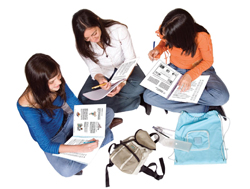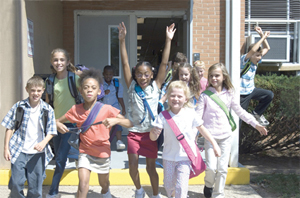
It is said that money can’t buy happiness but we know that one’s state of happiness affects one’s performance – be it as an adult or a child – and that before long, for more teachers, there is likely to be a stronger link between their pay and performance.
The education landscape is in a state of flux and increasingly there is a move towards listening to young people’s views. But who are the stakeholders – children, their parents and carers, teachers and others involved in the development of young people, future employers? Pupils may well find they are being encouraged to take more ownership of their learning. Teachers are asking themselves whether they need to teach differently and if so, how, in order to best meet the needs of their various students.

Socrates said, “Education is not the filling of a vessel but the kindling of a flame.” What a pleasure it is watching that flame glow, especially if you have been instrumental in fanning the spark by helping the child or young person to be happy and well motivated.
Experience shows that when teaching is actively underpinned with positive, uplifting values, children become enthused and engaged, resulting in profound improvements in their wellbeing and an extensive range of exhilarating rewards for the individuals, with the benefits rubbing off on their families, schools and communities.

When we begin to appreciate just how much the past was shaped by people’s values and understand the extent to which positive and negative values are affecting the present, we realise more and more how, with well considered, carefully chosen values, we are empowered to create the kind of future we would like to experience and leave as a legacy for generations to come.
Whatever subject we look into, whether it’s History, Geography, Art, Music, Literature, Languages, Sciences, Physical Education, Religious Education or ICT, we can soon find instances that illustrate the effects of positive values, such as honesty, compassion and respect, and the results of applying negative values such as intolerance, irresponsibility and deceit.

When we understand how something works, we can manage it better and are more likely to use it to good effect. The same is true of values, which impact every aspect of our lives but so often we are not consciously aware of their significance.
Take, for example, identifying what makes you “click” with someone. Start by considering what it is that you have in common and what it is that enables you to enjoy each other’s company and want to work together. How does the “clicking” manifest in terms of:

The London 2012 Games were a morale booster as influences from the powerful, universal Olympic values of excellence, friendship and respect spread and brought out so much goodness in so many people – from all walks of life and from all age groups.
The performances of all those involved in the London 2012 festival of sport – Olympians themselves, the organisers, all those who designed the superb and imaginative venues, those who took part in the impressive and enjoyable ceremonies, the Games Makers and even spectators - set many hearts and minds alight by their examples. They demonstrated just what can be achieved when talents and abilities – not only sporting - are nurtured and allowed to blossom to their full extent. They made abundantly clear what can happen when we have a purpose, live by and share what we treasure and value.

The Olympics brought into sharp focus just what can be achieved when individuals are set alight so that they can blossom and realise their full potential - and the sense of wellbeing when the spirit of service flourishes.
So what qualities shone as the Olympic torch travelled the length and breadth of the country? What characteristics were identified during the London 2012 Olympics opening ceremony? Which elements of the Games themselves demonstrated what can be accomplished when people are fired up?

Considering that any person who serves as an example and whose behaviour is emulated by others is a role model, the big ask is: What kind of attitudes are young people learning from us? Which skills are they developing from us? What knowledge are they gaining from us?
With a new academic year just over the horizon, the summer holidays could be a particularly good time for personal reflection and development, and consideration about how we can consciously motivate young people to make the most of their rich education opportunities and inspire them to become the best they can be, realise their full potential and live their dreams - while remaining true to themselves.

We are constantly making decisions, some of which are pretty routine but several can have significant, far-reaching effects on our lives and the lives of many others. Sometimes there is plenty of time to think through a matter but there are also occasions when split-second decisions are required – and one of the factors affecting our choices are our VALUES.
The strapline of The Decision Education Foundation is “Better Decisions – Better Lives”.
Considering how our values play such an important part in guiding our thinking, decision-making and ultimately, our actions and behaviour - and even how we shape our life chances and those of our children - it is vital that children and young people are educated in uplifting values-filled environments in which they are given plenty of real-life learning opportunities that enable them to experience, understand and commit to living by values that will enhance all aspects of their existence.
It is a natural sentiment for parents to want the best for their children and many who have entered the teaching profession have done so because of their love of children.

Silent sitting is an important part of a values education programme. It is an opportunity for children to quieten the mind and body and to be peaceful for a few minutes. It draws out the inner virtue from even the most aggressive children, allowing them to contact their inner source of wisdom.
Many young people are growing up without ever discovering an inner peace or finding this essential quality in their parents.
Silent sitting helps participants discover their true selves, not as others see them. When children are still, they are able to see things as they really are. As with all of us, children can get tensed up and suffer from negative emotions like anxiety and fear. When these emotions are present, children cannot concentrate fully.

A community-driven platform for showcasing the latest innovations and voices in schools
Pioneer House
North Road
Ellesmere Port
CH65 1AD
United Kingdom